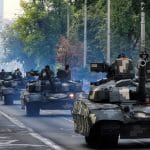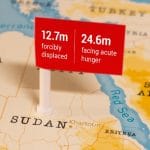International mediators hope that with the recent decision by Ethiopia to end the state of emergency in the country, the first green shoots of peace may be emerging. This decision is effective immediately.
Africa’s second-most populous nation has been torn apart by a brutal civil war that has so far lasted fifteen months. More than 10 million people have been displaced by the deadly fighting between government forces and Tigray rebels in the north challenging them under the flag of the TPLF (Tigray Popular Liberation Front). Both sides have traded allegations of crimes against civilians; most recently Amnesty International published last week a gruesome report accusing the TPLF of killing civilians and gang-raping young girls in the Amhara region last year.
But having now gained the upper hand on the field of battle, Prime Minister Abiy Ahmed has held back from any military advance on the Tigray capital Mekelle. It is claimed that the government forces made effective use of military drones supplied by China, Turkey and Iran to devastating effect. This has led to a reduction in hostilities, already highly disruptive to Ethiopia’s economy, which is being devastated by three years of drought, allowing a return to a degree of normalcy in some regions. But there continues to be fighting in the north of the country between the TPLF and forces in the Afar Region.
The improving security conditions gave the Ethiopian Parliament the confidence to vote for an early end to the six-month state of emergency which had been declared in November 2021 when the TPLF threatened to advance on the Ethiopian capital Addis Ababa. This fear has abated.
The United States Special Envoy for the Horn of Africa, Ambassador David Satterfield has welcomed the early lifting of the state of emergency in Ethiopia, calling it “another important step by the Government of Ethiopia to pave the way for a peaceful resolution of the ongoing conflict.” The United States continues to push for a cessation of hostilities, and a negotiated resolution to the conflict.
They have urged that the end of the state of emergency should now be followed by the release of individuals detained without charge, in order to facilitate an effective national dialogue. It still remains to be seen what format the national dialogue will take, how inclusive it will be and when it will begin.
The EU continues to express concern about protecting those affected by conflict in Tigray, Oromia and Afar, as well as refugees in the rest of the country. They have called for safe access to all areas affected by the war. For the meanwhile, the foreign media are viewed with suspicion in Ethiopia, making transparency and fact-finding difficult in the present environment. The free movement of aid workers has been restricted by roadblocks, curfews and the disruption of transport services imposed by the military under the state of emergency powers.
The United Nations believes that international mediators have been making progress. The African Union, which is based in Addis Ababa, has been under international pressure to push for a cease-fire in Ethiopia. But the organisation already faces extreme challenges in dealing with the Coronavirus pandemic on the continent, and in how to react to a spate of military coups in West Africa.
Ethiopia remains keen to support the initiatives of the African Union to enable the African neighbourhood to play its rightful role in brokering solutions to the political problems in Ethiopia that will safeguard Ethiopia’s sovereignty and territorial integrity and promote international cooperation within the framework of the United Nations.







